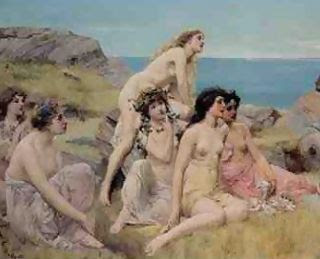In Greek mythology, Propoetides were described as a group of women from the city of Amathus on the island of Cyprus, and were first to prostitute their bodies' charms. A group of women (Propoetides) falled to worship goddess Aphrodite or refused to acknowledge Aphrodite was a goddess. Goddess Aphrodite punished them by robbing their all sense of shame. They lost the power to blush, as the blood hardened in their cheeks. So they began to prostitute themselves.
According to another version, whenever guests came to visit Propoetides, a group of women, who live in the city of Amathus on the island of Cyprus, turn them (guests) into human sacrifices. Aphrodite, who was the patron goddess of Cyprus, got angry and grows horns on Propoetides heads. But the Propoetides became more mischievous and began to say that Aphrodite was not a goddess. Aphrodite turn them into the world's first prostitutes. Propoetides lost all sense of shame and their reputation in public. In some versions, after some years, Aphrodite turned them into stones.
Index
According to another version, whenever guests came to visit Propoetides, a group of women, who live in the city of Amathus on the island of Cyprus, turn them (guests) into human sacrifices. Aphrodite, who was the patron goddess of Cyprus, got angry and grows horns on Propoetides heads. But the Propoetides became more mischievous and began to say that Aphrodite was not a goddess. Aphrodite turn them into the world's first prostitutes. Propoetides lost all sense of shame and their reputation in public. In some versions, after some years, Aphrodite turned them into stones.
Index

























